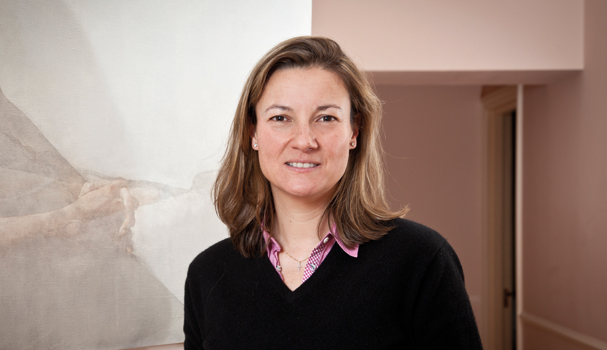Sara Murray, best known as the founder of comparison site confused.com and tracking company buddi, is a woman who doesn’t take no for an answer. Her first business, and several subsequently, was born from a desire to change the status quo – leaving those who didn’t share her vision trailing in her wake.
Murray has always been something of a rebel. But less in the sense of challenging authority; more because she didn’t find the authority challenging enough. “School teaches you how to get around stuff. It’s more important to have your socks pulled up properly than to actually be happy or learn anything,” she says. “Did I like it? No, not really. If you’ve got half a brain school’s quite boring.”
Born to a mother who retrained as a teacher when Murray was young, and a father who was a marketing director of an engineering company, Murray was the third of four children. She jokes that she was the ‘forgotten child’.
“My brother was the oldest and the only boy. My eldest sister was the first daughter, and my younger sister was the youngest daughter. I was nothing,” she smiles. “So I had to fight for attention.”
At school, Murray, by her own admission, did enough to get by. “The only school report I remember said, ‘At her best when cornered.’” She was more interested in spending time with her friends than attending classes. “I found people who were equally mischievous in trying to find ways around stuff,” she says. “We did the usual – getting suspended and so on. But I only pushed the boundaries to the point where I knew I wouldn’t get into too much trouble.”
Murray finally began to engage the grey matter when she applied to Oxford University to study philosophy, psychology and physiology. Rather than being intimidated by the famously arduous Oxbridge interview process, she loved it. “I quite enjoyed it because I got to show off a bit,” she says. “I was asked ridiculous questions. ‘What’s the meaning of life for a golden eagle?’ was one of them,” she recalls.
Unlike at school, Murray thrived at university. Her course – with just 25 students – was exciting and engaging, and non-curricular activities gained her attention too. She recalls one of the Oxford Dons giving a speech on the first day. “She said, ‘Everyone who comes to Oxford is probably capable of getting a first. If they were anywhere else they’d probably get a first. Most of them don’t, and the reason they don’t is because there is everything to do here. So, enjoy it. Really get the most out of university.’”
It was the best piece of advice she could have been given, says Murray. “I did loads, and had a fantastic time. It was non-stop good,” she beams.
As her time at university began to draw to a close, Murray applied to eight big consulting firms in London and was offered a place at one of them. Then an advert caught her eye in her college at Oxford. “It was for an American company that was growing rapidly and wanted to set up in Europe. They were going to take six people to the US to train them and then bring them back to set up an office in the UK,” she recalls.
Initially sceptical, she went along to the interview and was galvanised by the opportunity of working for an exciting, international, fast-growth company in the pharmaceutical sector. The perks weren’t bad, either. “They flew me business class to Chicago, which was all very impressive as a graduate.” She accepted the job, and after several months’ training, relocated back to the UK to set up the office with her five counterparts.
But the reality wasn’t quite as glamorous as she’d envisaged. “I was living in London, commuting out to Reading and quite literally working 23 hours a day. It was just ridiculous,” she says. So when she spotted an opportunity to write some code that would dramatically reduce her workload, she assumed her bosses would jump at the chance. “They didn’t think it was a good idea. So I did it myself. That was my first business,” she explains.
The then 21-year-old Murray and her business partner had no idea what they were letting themselves in for by setting up a company. “It wasn’t about starting a business, it was about serving a customer better than we were doing for the big guys,” says Murray.
Hard work and plenty of cold-calling paid off when the pair managed to get global healthcare giant SmithKline Beecham on board as a client. But the success was to be short-lived, when her former employer sued Murray and her partner.
“It was hideous,” Murray admits. “It went to the High Court and it stopped us working for a bit.” When the judge ruled in the start-up’s favour, Murray used the exposure to raise the fledgling business’s profile. “When they paid us our £2,000 or so damages, I sent a fax to the chief executives and chairmen of all the big pharmaceutical companies saying that they were trying to stop us – an up-and-coming competitor – from trading, because all the big pharma companies knew them.”
Murray’s serendipitous approach paid off: after this brush with the law, her company began working with 16 of the top 20 pharmaceutical firms in the world.
Several years passed, and Murray started getting itchy feet. She felt that there was a bigger opportunity to look at total marketing investment, rather than just that in a company’s sales force. Her business partner, meanwhile, wasn’t so keen to embark on another start-up, so they went their separate ways.
Murray’s new company, Ninah, began working with huge international brands, including Coca Cola and Masterfoods. But it wasn’t always straight-forward – and for reasons Murray hadn’t quite anticipated. “It wasn’t always easy as a woman,” she explains. “There were a lot of middle-aged, male marketing directors who just wouldn’t give a reason why they wouldn’t work with me. I’d say, ‘If I do this work, you’ll increase your profits by 10%’, and they’d say, ‘I’m not interested.’ And they couldn’t just not be interested in that. So, what they’d mean is, ‘I don’t want to do it with you.’”
One client she did work with extensively was Norwich Union. As she learned more about the insurance business, Murray pitched to the board that the only way they were going to reduce their operating costs, and therefore improve profitability, was to get online.
She then suggested that rather than each insurer spending £6m annually on television advertising, they instead each invested £1m into creating an online market. The board said no, that they couldn’t possibly work with competitors. True to form, Murray decided she’d do it herself. Which was how confused.com was born.
Norwich Union may not have seen the potential of such a venture, but customers clearly could, clamouring in their thousands to see if they could get cheaper car insurance: in the first 18 months, Murray had the support of more than 250,000 customers. The success of the start-up also caused ears to prick among would-be investors, and insurance company Admiral offered to buy a slice of the business. Murray wasn’t interested in giving a portion away – especially as she felt it would compromise the company’s integrity. But when Admiral came back with an offer she couldn’t refuse to buy the entire business, she signed on the dotted line in 2003.

Having flogged confused.com, Murray refocused her efforts on consulting firm Ninah that her sister and another consultant had been running in her absence. The business had been limping along and Murray decided to take some decisive action. “I’d got a new non-executive chairman, and we talked it all through and decided it would be best plugged into a global communications group,” she recalls. They subsequently sold it to Publicis.
After working two-thirds of her three-year buy-out, Murray decided she’d retire. With a reasonable wedge in the bank, she didn’t really need to work (though just how much selling her businesses had netted Murray is anyone’s guess – “I never talk about money,” she says). But Murray’s plans to take a well-earned rest didn’t end up coming to fruition. After just a few weeks she was mulling over new opportunities. “The thing is, more often than not, your friends aren’t retired. And I’m certainly not a golfer. So there’s not actually much to do.”
Rather than twiddling her thumbs, Murray began drafting plans for her next business. Her mind drifted back to when daughter Rowenna, now 20, was a toddler. “When she was quite small I’d done the thing of being in a supermarket and turning around to find she wasn’t there,” says Murray. “It’s a heart-stopping moment.”
“I was right at the checkout, so I said, ‘My daughter’s missing’ to the girl at the till and there was a security guard there who immediately stepped forward and said, ‘Don’t panic, we’ll sweep the shop, you go and stand at the exit of the car park and look in the backs of the cars as they leave,” Murray recalls. “Of course, I ignored him totally and went screaming around the shop.”
Murray’s supermarket panic coincided with a sudden spike in growth in the semi-conductor market in the US. “I didn’t know what a semi-conductor was so started reading around semi-conductors and came across GPS chips and what was happening and the miniaturisation of them, and it all fell into place: I decided to make something small enough for children to carry around and then parents will never lose their kids any more ” Murray explains.
After some research, the entrepreneur discovered that a US company called Wherify Wireless had spent $180m building a GPS watch. So she approached them, initially as a consumer. “The conversation went backwards and forwards with them so many times, I just couldn’t get one,” she recalls. “I asked them, ‘What is the problem?’ and they said they weren’t sold outside America.” When Murray found out they didn’t have a European distribution partner, she asked if she could do it herself. The company told her they didn’t have a European distributor because the technology couldn’t be used outside the US, and that they’d get back to her in three or four years.
Not one to take no for an answer, Murray spotted an opportunity. “I thought to myself, ‘How hard can it be?’” she smiles. “Obviously, if I knew then what I know now, I wouldn’t have dreamed of it.”
Murray put together a technical team of mechanical designers, hardware specialists, electrical engineers and much more besides, and designed the first buddi devices in 2005.
“I didn’t really know what the market would look like, so I just made a few available on the internet and waited to see what would happen,” she says.
Yet it wasn’t the initial market she’d had in mind for the product: instead of parents flocking to buy the device, it was local councils. “The people who came to us were local authorities looking after older people. They said, ‘Older people go wandering and the family come to us and say they want them in full-time care because they can’t cope.’ Sometimes they’re wandering around for long enough that they don’t make it home,” says Murray.

With their buddi, the person wears the device at all times, and then when their family notices they’re missing they can look up online where they are and bring them home, Murray explains. The products certainly captured the imagination of carers: the company now works with 275 local authorities, who buy it on behalf of families caring for elderly or vulnerable people. That version of the product is £300 to buy, and then costs £20 a month.
But the GPS tracking devices aren’t without their challenges. One of the key problems is their short battery life, says Murray. “There was nobody there to charge them,” she explains. Another stumbling block has been the size and design of GPS trackers. They’re bulky and unsightly. “If I were that age I wouldn’t want to wear a big white box around my neck with a big red button,” she says. “I don’t know why we would think that older people suddenly don’t mind.”
As such, with the aid of a grant from the Design Council, the company has been working hard on a nifty new buddi product, which will launch this summer. The buddiband is comfortable, discreet and waterproof. To avoid previous problems associated with battery charging, it is fitted with the most rechargeable possible battery and designed to be super power-efficient. Having been given a sneak-peek at the shiny, new product, we can promise it warrants all the attention it has been generating. Watch this space.
The other market that buddi plays in is offender monitoring. Having worked on two huge government procurement bids for the past two years, Murray will find out if her company has won either (or both) of the MoJ contracts in April. She is confident of her chances, despite stiff competition from the likes of Serco and G4S.
As she awaits the results, she will have a little more time to indulge in one of her favourite pastimes: flying helicopters. It’s now been two years since Murray got her licence, and while she admits to being a “fairweather flyer”, she says there is nothing like taking to the controls of a ’copter. “When you’re flying, you can’t think about anything else; you can’t think about business. For me, it’s 100% concentration on flying,” she says.
One thing’s for sure: Sara Murray is a high flyer – in many senses of the word. It’s no surprise, therefore, that she’s inspiring young people to take the plunge and start to grow their own businesses. She sits on the Government’s Technology Strategy Board and is a mentor at Seedcamp – an organisation that was set up to jumpstart entrepreneurial activity in the UK.
But Murray says that true entrepreneurs don’t need her help initially. “I kind of think that a real entrepreneur, who’s going to really make it, doesn’t actually need advice from someone like me; they’ve probably already started something,” she says. And for those who haven’t, her advice is simple. “Get on and do it.” ![]()
Share via:








































